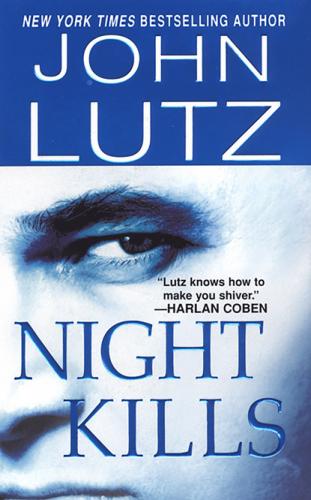Chapter 39
Chapter 40
Chapter 41
Chapter 42
Chapter 43
Chapter 44
Chapter 45
Chapter 46
Chapter 47
Chapter 48
Chapter 49
Chapter 50
Chapter 51
Chapter 52
Chapter 53
Chapter 54
Chapter 55
Chapter 56
Chapter 57
Chapter 58
Chapter 59
Chapter 60
Chapter 61
Chapter 62
Chapter 63
Chapter 64
Chapter 65
Chapter 66
Chapter 67
Chapter 68
Chapter 69
Chapter 70
Chapter 71
Chapter 72
Chapter 73
Chapter 74
Chapter 75
Chapter 76
Chapter 77
Chapter 78
Chapter 79
1
Madeline was on the run.
She should have known better. She really should have.
An insect—a large bee or wasp—whizzed past close to her ear as she skidded around a corner, her right foot almost slipping out of her low-cut sneaker. An instant later came a flat Blam! She knew he was shooting at her.
No doubt now as to what he’d had in mind in the car.
He’s trying to kill me!
Why? What did I do?
She was gasping for breath now, beginning to stumble from exhaustion as she ran down the dark street. Even late as it was, even in this neighborhood, somebody must be awake who would help her. Anyone!
Terror propelled her. Terror and the steady, relentless pounding of his footsteps behind her.
What caused this?
What’s this about?
If he gets close enough to take another shot…
Her right side was aching now. The pain was an enemy trying to bend her body forward so she could no longer run, no longer live. Her legs weren’t merely tired. They were becoming so numb that she could hardly feel any contact with the sidewalk.
Madeline was ready to surrender to the inevitable, and then she saw a shifting of shadow and a brightening at the next dark intersection.
A car’s coming!
Behind her, closer, the gun fired again. It sounded like the flat of one huge palm slapping against another. There was a finality to the sharp report.
It signaled the end of something.
2
Retired homicide detective Frank Quinn was having strong black coffee after his breakfast at the Lotus Diner on Amsterdam when a saggy-jowled man who looked like a well-tailored bloodhound sat down opposite him.
“I know I’m late,” the bloodhound growled.
“How so?” Quinn asked, sipping his coffee.
“If it were up to you, I’d have been here much sooner.”
Quinn didn’t answer. Overconfident people bored him.
The two men were almost exact opposites. The bloodhound, who was New York Police Commissioner Harley Renz, was not only saggy jowled but saggy bodied. He’d put on about forty pounds in the past few years, and the expensive chalk-stripe blue suit didn’t disguise it as workable muscle. All vertical stripes did for Renz was zigzag.
Quinn, on the other hand, was tall and rangy, with a firm jaw, a nose broken once too often, and disconcerting flat green eyes. His straight, gray-flecked dark hair was cut short, and recently, but, as always, looked as if a barber should shape it to suit a human head. If Renz was the bloodhound, there was something of the wolf in Quinn.
“You’re glad to see me,” Renz went on, “because you don’t like rotting in retirement at the age of fifty-five.”
Thel the waitress came over and Quinn said, “A coffee for my antagonist.”
“I haven’t had breakfast,” Renz said. “I’ll have a waffle, too. Diet syrup.”
“Stuff tastes like tree sap,” Thel said. She was a dumpy, middle-aged woman who’d never been pretty, so substituted being frank. It worked pretty well for her.
“The real stuff, then,” Renz said, grateful to be nudged off his diet.
Quinn listened for a moment to Upper West Side traffic flowing past on Amsterdam. Somebody just outside shouted an obscenity. Somebody leaned on a car horn and shouted back. New York.
“I’m rotting fast,” he said. “Why don’t you get to the point?”
“Sure. I need you and your team again.”
Quinn and the two detectives Renz had assigned to him on his last case had become media darlings by tracking down a serial killer aptly called the Butcher. Their success had also resulted in Renz’s swift climb up the promotional ladder to commissioner. He was, in fact, one of the most popular commissioners the city had ever known. In New York that meant he could do just about as he pleased, including yanking three detectives temporarily back into the NYPD as long as they were willing. He knew Quinn would be willing. And if Quinn was willing, so would be his two detectives. Like Renz, Quinn was a hard man to refuse.
“Why do you need us?”
Renz smiled. Still looked like a bloodhound. “In this city, Quinn, you’re Mister Serial Killer.”
“I’m not sure I like the way you put that.”
“You know what I mean.”
“Last time we went to work for you, you got promoted all the way to commissioner.”
“And you got your good name back and became a big hero. There’s something in this for both of us, Quinn. This for that. Tit for tat. That’s how the world works.”
“Your world.”
“Well, that’s the one I live in.”
“What’s next for you, Harley, mayor?”
Renz shrugged. “Who knows?” He seemed serious. Quinn couldn’t see Harley as mayor. But then he hadn’t been able to see him as police commissioner, and there he sat. Police commissioner.
“What are the terms?” Quinn asked.
“Work for hire. It won’t interfere with your settlement or interrupt your retirement pay.”
Quinn wasn’t worried about the pay. Soon after the Night Prowler case, he’d gotten a large settlement from the city after having been falsely accused of raping a fourteen-year-old girl. Another cop had done it, and Quinn proved it. There was noplace Quinn could go to get his reputation back, so he settled
